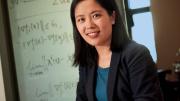As a pure-mathematics student at China’s Zhejiang University, Na Li often asked professors how her courses applied to real-life systems. If she stuck to her non-overlapping science and math classes, they said, she’d figure it out. Hoping to study mathematical biology at a UCLA summer research program before senior year, she was instead assigned to an engineering lab. “I was like, ‘What do you mean? I don’t know what mechanical engineering is, I don’t know what electrical engineering is.’” To prepare, she read Signals and Systems, a systems theory textbook that applied math to the study of complex entities. It clicked: this was the field for her. Li, now Cabot associate professor of electrical engineering and applied mathematics, deals mostly with the electric power grid in her research, transforming an outdated system to handle variable, alternative energy sources like wind and solar. Though some scoff at the possibility of a cascading power failure, Li, who experienced frequent power outages while growing up in rural China, does not: “I know the grid is not really reliable if you don’t have the right infrastructure and the right algorithms.” Her expertise expands beyond power systems. She remains fascinated with biology and physiology, and grabbed a copy of How the Immune System Works from her bookshelf to demonstrate the omnipresence of networks in the human body. “I still treat biology systems as a network. It’s just the network has different nodes and different interactions.” At home with her two young children, Li takes a break from systems and devours books on early childhood education. Even then, she can’t turn off her analytical approach: “It helps me think about why I have emotions. What is a rational way, what’s the irrational way, and how to control them….I have a lot of scientific theorems to explain what’s going on.”
An electrical engineer and applied mathematician, in brief
An electrical engineer and applied mathematician, in brief
For a star electrical engineering professor, it's all about systems.

Na Li
Photograph by Stu Rosner
You might also like
How a Harvard Hockey Legend Became a Needlepoint Artist
Joe Bertagna’s retirement project recreates figures from Boston sports history.
Introductions: Mallika Monteiro
A conversation with a beer industry executive
Mount Vernon, Historic Preservation, and American Politics
Anne Neal Petri promotes George Washington and historic literacy.
Most popular
Explore More From Current Issue

Rabbi, Drag Queen, Film Star
Sabbath Queen, a new documentary, follows one man’s quest to make Judaism more expansive.

How a Harvard Hockey Legend Became a Needlepoint Artist
Joe Bertagna’s retirement project recreates figures from Boston sports history.





